中国传统文化翻译
中国传统文化名词翻译

禅 Zen 混沌 chaos
五行说 theory of five elements
坐禅 transcendental meditation 有超凡认知体验 的冥想行为
节日
春节 Spring Festival 元宵节 Lantern Festival 清明节 Pure Bright Festival / Tomb Sweeping Day
铁饭碗 Iron Bowl 一国两制 One Country, Two Systems 素质教育 Essential-qualities-oriented Education 大跃迚 Great Leap Forward
中国特色的社会主义 Socialist with Chinese characteristics 下岗 Lay off/Laid off
剪纸 Paper Cutting 针灸 Acupuncture 四合院 Quadrangle 衙门 yamen
儒家文化 Confucian Culture 儒学 Confucianism 孔子 Confucius 孟子 Mencius
中庸 the way of medium 孙子兵法 The Art of War by Master Sun 京剧 Beijing Opera/Peking Opera 秦腔 Crying of Qin People/Qin Opera
端午节 Dragon Boat Festival 七夕节 Double Seventh Festival 中秋节 Mid-Autumn Day/Festival 重阳节 Double Ninth Festival
食物
馒头 Steamed bun/steamed bread 米饭 rice 花卷 steamed twisted rolls 馄饨 wonton
四级翻译核心100词
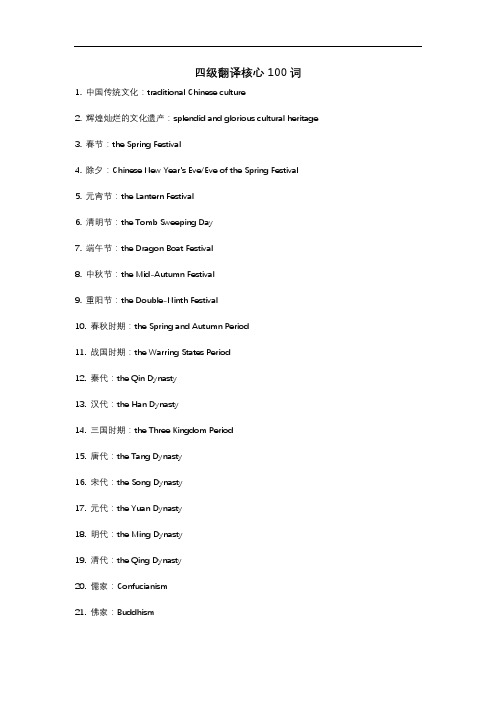
四级翻译核心100词1. 中国传统文化:traditional Chinese culture2. 辉煌灿烂的文化遗产:splendid and glorious cultural heritage3. 春节:the Spring Festival4. 除夕:Chinese New Year’s Eve/Eve of the Spring Festival5. 元宵节:the Lantern Festival6. 清明节:the Tomb Sweeping Day7. 端午节:the Dragon Boat Festival8. 中秋节:the Mid-Autumn Festival9. 重阳节:the Double-Ninth Festival10. 春秋时期:the Spring and Autumn Period11. 战国时期:the Warring States Period12. 秦代:the Qin Dynasty13. 汉代:the Han Dynasty14. 三国时期:the Three Kingdom Period15. 唐代:the Tang Dynasty16. 宋代:the Song Dynasty17. 元代:the Yuan Dynasty18. 明代:the Ming Dynasty19. 清代:the Qing Dynasty20. 儒家:Confucianism21. 佛家:Buddhism22. 道家:Taoism/Daoism23. 孔子:Confucius24. 孟子:Mencius25. 仁:goodness/benevolence26. 义:righteousness27. 礼:ritual/politeness28. 智:wisdom29. 信:trust30. 忠:loyalty31. 孝:filial piety32. 廉:honesty33. 耻:honor34. 《诗经》:The Book of Songs35. 《史记》:Historical Records36. 《西游记》:The Journey to the West37. 《水浒》:Water Margin/Outlaws of the Marsh38. 《红楼梦》:A Dream of Red Mansions39. 《三国演义》:Romance of the Three Kingdoms40. 剪纸:Paper Cutting41. 中国结Chinese knot42. 皮影戏shadow play43. 火锅:hot pot44. 书法:calligraphy45. 对联:couplets46. 四合院:siheyuan/quadrangle47. 火药:gunpowder48. 农历:lunar calendar49. 物质文明:material civilization50. 精神文明:spiritual civilization51. 京剧:Beijing/Peking Opera52. 功夫:Kungfu53. 太极拳:Tai Chi54. 天坛:Altar of Heaven in Beijing55. 故宫博物院:The Palace Museum56. 相声:cross-talk/comic dialogue57. 北京烤鸭:Beijing Roast Duck58. 烟花爆竹:fireworks and firecracker59. 敦煌莫高窟:Mogao Caves60. 一国两制:One Country, Two Systems61. 香港澳门同胞:Compatriots from Hong Kong and Macao62. 长江中下游地区:The Mid-low Reaches of Yangtze River63. 中外合资企业:Joint Ventures64. 大中型国有企业:large and medium-sized state-owned enterprises65. 文化交流cultural exchanges66. 文化融合cultural blending/integration67. 西方文化western culture68. 多元文化multi-culture69. 文化多元化cultural diversity70. 保存珍惜preserve and cherish71. 取其精华absorb its essence72. 去其糟粕resist its dark side73. 积极促进文化发展promote cultural development positively74. 与时俱进keeping pace with times75. 文化传统cultural traditions76. 人类文明human civilization77. 主流文化mainstream culture78. 解读经典interpretation of classics79. 市场经济体制market economy system80. 经济全球化economic globalization81. 科技进步advancement in science and technology82. 私营企业private enterprise83. 汽车产业automobile industry84. 房地产业real estate industry85. 电信产业telecommunication industry86. 国产品牌domestic/national/Chinese brand87. 市场份额market share/portion88. 公司company/corporation89. 吸引外资attract foreign investment90. 深远的社会经济影响profound social and economic consequences91. 改革开放the reform and opening-up92. 社会保障体系social security system93. 住房问题housing problem94. 公用基础设施public infrastructure95. 经济危机economic crisis96. 金融危机:financial crisis97. 经济不景气economic depression/downturn98. 找工作seek employment/hunt job99. 找工作者job seeker/hunter100.应对危机fight/deal with crisis。
六级中国传统文化翻译单词
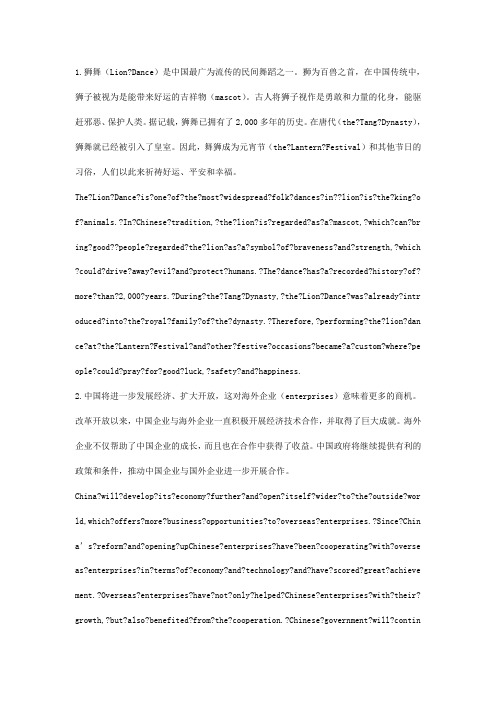
1.狮舞(Lion?Dance)是中国最广为流传的民间舞蹈之一。
狮为百兽之首,在中国传统中,狮子被视为是能带来好运的吉祥物(mascot)。
古人将狮子视作是勇敢和力量的化身,能驱赶邪恶、保护人类。
据记载,狮舞已拥有了2,000多年的历史。
在唐代(the?Tang?Dynasty),狮舞就已经被引入了皇室。
因此,舞狮成为元宵节(the?Lantern?Festival)和其他节日的习俗,人们以此来祈祷好运、平安和幸福。
The?Lion?Dance?is?one?of?the?most?widespread?folk?dances?in??lion?is?the?king?o f?animals.?In?Chinese?tradition,?the?lion?is?regarded?as?a?mascot,?which?can?br ing?good??people?regarded?the?lion?as?a?symbol?of?braveness?and?strength,?which ?could?drive?away?evil?and?protect?humans.?The?dance?has?a?recorded?history?of? more?than?2,000?years.?During?the?Tang?Dynasty,?the?Lion?Dance?was?already?intr oduced?into?the?royal?family?of?the?dynasty.?Therefore,?performing?the?lion?dan ce?at?the?Lantern?Festival?and?other?festive?occasions?became?a?custom?where?pe ople?could?pray?for?good?luck,?safety?and?happiness.2.中国将进一步发展经济、扩大开放,这对海外企业(enterprises)意味着更多的商机。
100个中国传统文化词汇的英文翻译翻译
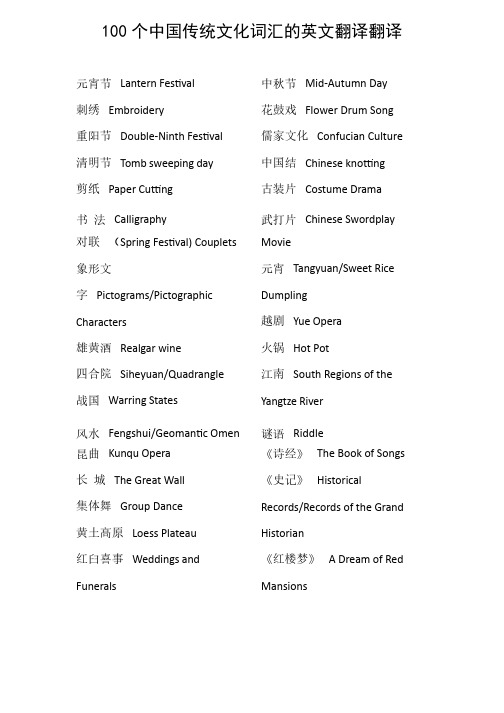
100个中国传统文化词汇的英文翻译翻译元宵节元宵节 Lantern Fes val 刺绣刺绣Embroidery 重阳节重阳节Double-Ninth Fes val 清明节清明节Tomb sweeping day 剪纸剪纸Paper Cu ng 书 法Calligraphy 对联对联 (Spring Fes val) Couplets 象形文字 Pictograms/Pictographic Characters雄黄酒雄黄酒Realgar wine 四合院四合院Siheyuan/Quadrangle 战国战国Warring States 风水风水Fengshui/Geoman c Omen 昆曲昆曲Kunqu Opera 长 城 The Great Wall 集体舞集体舞Group Dance 黄土高原黄土高原Loess Plateau 红臼喜事红臼喜事 Weddings and Funerals中秋节中秋节Mid-Autumn Day 花鼓戏花鼓戏Flower Drum Song 儒家文化儒家文化Confucian Culture 中国结中国结Chinese kno ng 古装片古装片Costume Drama 武打片武打片 Chinese Swordplay Movie元宵元宵 Tangyuan/Sweet Rice Dumpling 越剧越剧 Yue Opera 火锅火锅Hot Pot 江南江南 South Regions of the Yangtze River 谜语谜语Riddle 《诗经》《诗经》 The Book of Songs 《史记》《史记》Historical Records/Records of the Grand Historian《红楼梦》《红楼梦》 A Dream of Red Mansions《西游记》《西游记》 The Journey to the West除夕除夕Chinese New Year’s Eve/Eve of the Spring Fes val 针灸针灸Acupuncture 唐三彩唐三彩 Tri-color Po ery of the TangDynasty/ The Tang Tri-colored po ery 孔子孔子 Confucius 偏旁偏旁 Radical 孟子孟子Mencius 亭/ 阁 Pavilion/ A c 黄梅戏黄梅戏Huangmei opera 火 药 Gunpowder 农历农历Lunar Calendar 印/ 玺 Seal/Stamp 腊 八 节 The laba Rice Porridge Fes val京 剧 Beijing Opera/Peking Opera秦腔秦腔Crying of Qin People/Qin Opera 太极拳太极拳TaiChi 《本草纲目》《本草纲目》 Compendium of Materia Medica天坛天坛Altar of Heaven in Beijing 小吃摊小吃摊Snack Bar/Snack Stand 红双喜红双喜Double Happiness 文房四宝(笔墨纸砚)笔墨纸砚) The Four Treasure of the Study (Brush,Inks ck,Paper,and Inkstone ) 春卷春卷Spring Roll(s) 莲藕莲藕Lotus Root 罗盘罗盘Luopan/ compass 故宫博物院故宫博物院The Palace Museum 相声相声Cross-talk/Comic Dialogue 五行五行Five Phases 北京烤鸭北京烤鸭Beijing Roast Duck 《桃花扇》《桃花扇》 The Peach Blossom Fan木偶戏木偶戏Puppet Show 敦煌莫高窟敦煌莫高窟Mogao Caves电视小品电视小品TV Sketch/TV Skit 甲骨文甲骨文Oracle Bone Inscrip ons 古筝古筝Chinese Zither 杂技杂技acroba cs 门当户对门当户对 Perfect Match/Exact Match《水浒》《水浒》 Water Margin/Outlaws of the Marsh除夕除夕Chinese New Year's Eve 国子监国子监Imperial Academy 兵马俑兵马俑 Co a Warriors/ Terraco a Army 旗袍旗袍Cheongsam 中国古代四大发明中国古代四大发明the four great inven ons of ancient China (火药gunpowder 印刷术prin ng 造纸术paper-making 指南针the compass ) 泼水节泼水节 Water-Splashing Day 馄饨馄饨Wonton 花卷花卷Steamed twisted rolls 羊肉泡馍羊肉泡馍Pita Bread Soaked in Lamb Soup冰糖葫芦冰糖葫芦 A s ck of sugar-coated haws (or apples,etc.) 八宝饭八宝饭 Eight-treasure rice pudding粉丝粉丝Glass Noodles 豆腐脑豆腐脑 Jellied bean curd 小品小品Wi y Skits 孝顺孝顺To show filial obedience 武术武术 Wushu(Chinese Mar al Arts)宣纸宣纸Rice Paper 陶器陶器po ery/earthenware 佛教佛教Buddhism 中庸中庸 The way of medium(Golden Means) 爆竹爆竹firecracker 东坡肉东坡肉Dongpo Pork 中山陵中山陵 The Sun Yat-sen Mausoleum秦淮河秦淮河Qinhuai River 玄武湖玄武湖Xuanwu Lake夫子庙夫子庙The Confucian Temple 鸭血粉丝鸭血粉丝Duck blood fans 盐水鸭盐水鸭 Yanshuiya, or salted and baked duck 大煮干丝大煮干丝Gansi 小笼包小笼包Steamed buns 明孝陵明孝陵Ming Tomb 云锦云锦 Nanjing brocade。
汉英翻译 中国传统文化
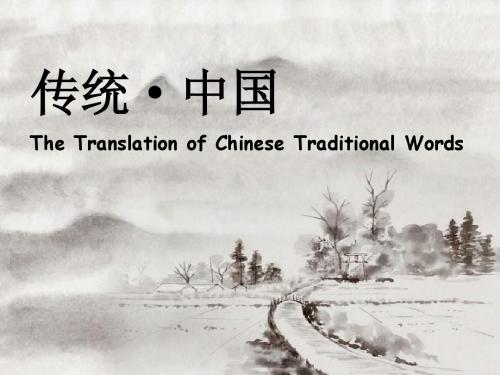
中国电信 China Telecom 中国移动 China Mobile 十五计划 the 10th Five-Year Plan 中国电脑联网 Chinanet 三峡工程 the Three Gorges Project 希望工程 Project Hope 京九铁路 Beijing CKowloon Railway 扶贫工程 Anti-Poverty Project 菜篮子工程 Vegetable Basket Project 温饱工程 Decent-Life Project 安居工程 Economy Housing Project 西部大开发 Go-West Campaign
传统·中国
The Translation of Chinese Traditional Words
八卦 trigram
阴、阳 yห้องสมุดไป่ตู้n, yang
道 Dao(cf. logo) 道 Daoism(Taoism) 江湖(世界) the jianghu World (the traits’ world) e.g. You can’t control everything in a traits’ world. (人在江湖,身不由己)
儒学 Confucianism 世外桃源 Shangri-la or Arcadia 治则兴,乱则衰 Order leads to prosperity and chaos to decline 禅宗 Zen Buddhism 禅 dhyana; dhgaya 混沌 chaos 道 Daosim, the way and its power 四谛 Four Noble Truth 八正道 Eightfold Path 无常 anity 五行说 Theory of Five Elements 无我 anatman 坐禅 metta or transcendental meditation 空 sunyata 虚无 nothingness
中国传统文化翻译解读
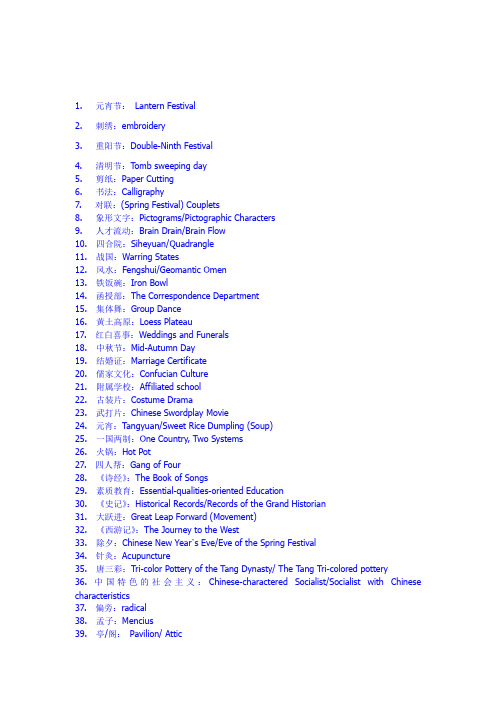
1. 元宵节:Lantern Festival2. 刺绣:embroidery3. 重阳节:Double-Ninth Festival4. 清明节:Tomb sweeping day5. 剪纸:Paper Cutting6. 书法:Calligraphy7. 对联:(Spring Festival) Couplets8. 象形文字:Pictograms/Pictographic Characters9. 人才流动:Brain Drain/Brain Flow10. 四合院:Siheyuan/Quadrangle11. 战国:Warring States12. 风水:Fengshui/Geomantic Omen13. 铁饭碗:Iron Bowl14. 函授部:The Correspondence Department15. 集体舞:Group Dance16. 黄土高原:Loess Plateau17. 红白喜事:Weddings and Funerals18. 中秋节:Mid-Autumn Day19. 结婚证:Marriage Certificate20. 儒家文化:Confucian Culture21. 附属学校:Affiliated school22. 古装片:Costume Drama23. 武打片:Chinese Swordplay Movie24. 元宵:Tangyuan/Sweet Rice Dumpling (Soup)25. 一国两制:One Country, Two Systems26. 火锅:Hot Pot27. 四人帮:Gang of Four28. 《诗经》:The Book of Songs29. 素质教育:Essential-qualities-oriented Education30. 《史记》:Historical Records/Records of the Grand Historian31. 大跃进:Great Leap Forward (Movement)32. 《西游记》:The Journey to the West33. 除夕:Chinese New Year’s Eve/Eve of the Spring Festival34. 针灸:Acupuncture35. 唐三彩:Tri-color Pottery of the Tang Dynasty/ The Tang Tri-colored pottery36. 中国特色的社会主义:Chinese-charactered Socialist/Socialist with Chinese characteristics37. 偏旁:radical38. 孟子:Mencius39. 亭/阁:Pavilion/ Attic40. 大中型国有企业:Large and Medium-sized State-owned Enterprises41. 火药:gunpowder42. 农历:Lunar Calendar43. 印/玺:Seal/Stamp44. 物质精神文明建设:The Construction of Material Civilization and Spiritual Civilization45. 京剧:Beijing Opera/Peking Opera46. 秦腔:Crying of Qin People/Qin Opera47. 太极拳:Tai Chi48. 独生子女证:The Certificate of One-child49. 天坛:Altar of Heaven in Beijing50. 小吃摊:Snack Bar/Snack Stand51. 红双喜:Double Happiness52. 政治辅导员:Political Counselor/School Counselor53. 春卷:Spring Roll(s)54. 莲藕:Lotus Root55. 追星族:Star Struck56. 故宫博物院:The Palace Museum57. 相声:Cross-talk/Comic Dialogue58. 下岗:Lay off/Laid off59. 北京烤鸭:Beijing Roast Duck60. 高等自学考试:Self-taught Examination of Higher Education61. 烟花爆竹:fireworks and firecracker62. 敦煌莫高窟:Mogao Caves63. 电视小品:TV Sketch/TV Skit64. 香港澳门同胞:Compatriots from Hong Kong and Macao65. 文化大革命:Cultural Revolution66. 长江中下游地区:The Mid-low Reaches of Yangtze River67. 门当户对:Perfect Match/Exact Match68. 《水浒》:Water Margin/Outlaws of the Marsh69. 中外合资企业:Joint Ventures70. 文房四宝(笔墨纸砚):"The Four Treasure of the Study" "Brush, Inkstick, Paper, and Inkstone"71.兵马俑:cotta Warriors/ Terracotta Army72.旗袍:cheongsam要了解中国文化,就应该对中国的戏曲文化有所了解。
常用中国传统文化英文翻译
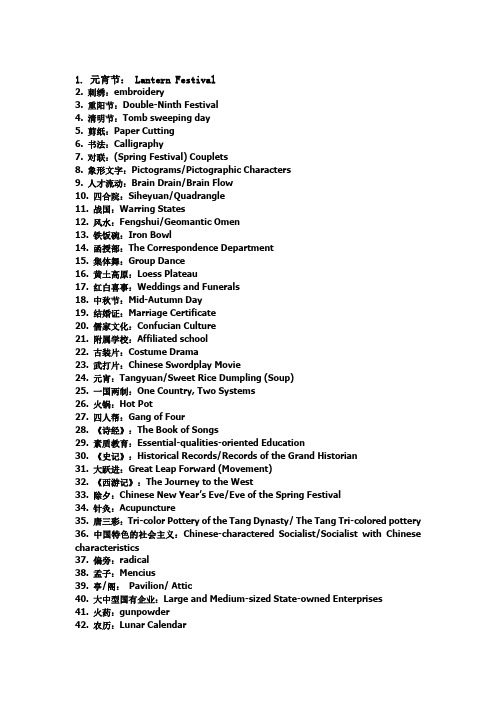
1. 元宵节: Lantern Festival2. 刺绣:embroidery3. 重阳节:Double-Ninth Festival4. 清明节:Tomb sweeping day5. 剪纸:Paper Cutting6. 书法:Calligraphy7. 对联:(Spring Festival) Couplets8. 象形文字:Pictograms/Pictographic Characters9. 人才流动:Brain Drain/Brain Flow10. 四合院:Siheyuan/Quadrangle11. 战国:Warring States12. 风水:Fengshui/Geomantic Omen13. 铁饭碗:Iron Bowl14. 函授部:The Correspondence Department15. 集体舞:Group Dance16. 黄土高原:Loess Plateau17. 红白喜事:Weddings and Funerals18. 中秋节:Mid-Autumn Day19. 结婚证:Marriage Certificate20. 儒家文化:Confucian Culture21. 附属学校:Affiliated school22. 古装片:Costume Drama23. 武打片:Chinese Swordplay Movie24. 元宵:Tangyuan/Sweet Rice Dumpling (Soup)25. 一国两制:One Country, Two Systems26. 火锅:Hot Pot27. 四人帮:Gang of Four28. 《诗经》:The Book of Songs29. 素质教育:Essential-qualities-oriented Education30. 《史记》:Historical Records/Records of the Grand Historian31. 大跃进:Great Leap Forward (Movement)32. 《西游记》:The Journey to the West33. 除夕:Chinese New Year’s Eve/Eve of the Spring Festival34. 针灸:Acupuncture35. 唐三彩:Tri-color Pottery of the Tang Dynasty/ The Tang Tri-colored pottery36. 中国特色的社会主义:Chinese-charactered Socialist/Socialist with Chinese characteristics37. 偏旁:radical38. 孟子:Mencius39. 亭/阁:Pavilion/ Attic40. 大中型国有企业:Large and Medium-sized State-owned Enterprises41. 火药:gunpowder42. 农历:Lunar Calendar43. 印/玺:Seal/Stamp44. 物质精神文明建设:The Construction of Material Civilization and Spiritual Civilization45. 京剧:Beijing Opera/Peking Opera46. 秦腔:Crying of Qin People/Qin Opera47. 太极拳:Tai Chi48. 独生子女证:The Certificate of One-child49. 天坛:Altar of Heaven in Beijing50. 小吃摊:Snack Bar/Snack Stand51. 红双喜:Double Happiness52. 政治辅导员:Political Counselor/School Counselor53. 春卷:Spring Roll(s)54. 莲藕:Lotus Root55. 追星族:Star Struck56. 故宫博物院:The Palace Museum57. 相声:Cross-talk/Comic Dialogue58. 下岗:Lay off/Laid off59. 北京烤鸭:Beijing Roast Duck60. 高等自学考试:Self-taught Examination of Higher Education61. 烟花爆竹:fireworks and firecracker62. 敦煌莫高窟:Mogao Caves63. 电视小品:TV Sketch/TV Skit64. 香港澳门同胞:Compatriots from Hong Kong and Macao65. 文化大革命:Cultural Revolution66. 长江中下游地区:The Mid-low Reaches of Yangtze River67. 门当户对:Perfect Match/Exact Match68. 《水浒》:Water Margin/Outlaws of the Marsh69. 中外合资企业:Joint Ventures70. 文房四宝(笔墨纸砚):"The Four Treasure of the Study" "Brush, Inkstick, Paper, and Inkstone"71. 兵马俑:cotta Warriors/ Terracotta Army72. 旗袍:cheongsam。
中国传统文化英语翻译
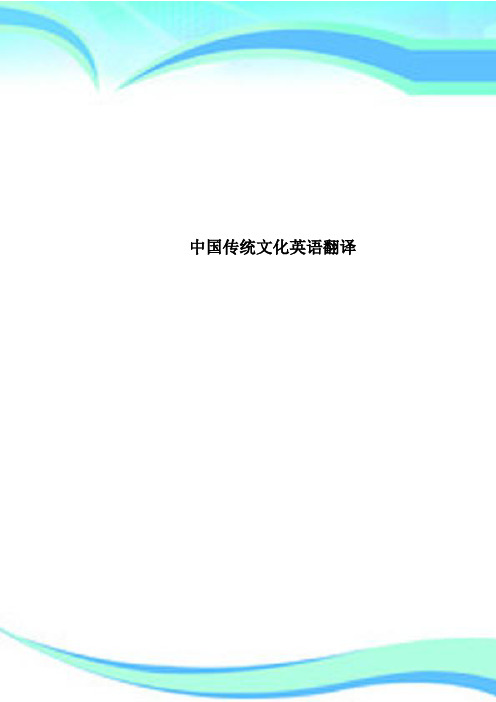
45.京剧:BeijingOpera/PekingOpera
46.秦腔:CryingofQinPeople/QinOpera
47.太极拳:Tai Chiﻫ48.独生子女证:TheCertificate ofOne-child
64.香港澳门同胞:CompatriotsfromHongKong andMacao
65.文化大革命:Cultural Revolution
66.长江中下游地区:TheMid-lowReaches of Yangtze Riverﻫ67.门当户对:PerfectMatch/Exact Match
68.《水浒》:Water Margin/Outlaws of the Marsh
49.天坛:AltarofHeaveninBeijingﻫ50.小吃摊:Snack Bar/SnackStand
51.红双喜:Double Happinessﻫ52.政治辅导员:Political Counselor/SchoolCounselor
53.春卷:SpringRoll(s)
54.莲藕:LotusRootﻫ55.追星族:StarStruckﻫ56.故宫博物院:ThePalace Museumﻫ57.相声:Cross-talk/ComicDialogue
一、对龙图腾他的崇拜在中国大约已绵延了八千多年。中国龙是古人将鱼、蛇、马、牛等动物与云雾、雷电等自然天象集合而成的一种神物。中国龙的形成与中华民族的多元融合过程同步。在中国人的心目中,龙具有振奋腾飞、开拓变化的寓意和团结凝聚的精神。ﻫChineseDragonDragon totem worship inChinahasbeenaroundfor the last 8,000years.Theancients inChina consideredthe dragon (or loong)afetish thatcombinesanimalsincluding the fish,snake,horseandox withcloud,thunder,lightning and other natural celestialphenomena.TheChinesedragonwas formedin accordance withthe multiculturalfusionprocess of theChinesenation. To the Chinese,thedragonsignifiesinnovationandcohesion.ﻫ二、秧歌舞是中国汉族的一种民间传统舞蹈,通常在北方省份表演。秧歌舞者通常穿上明亮多彩的表演服装,他们的表演动作有力迅速。在农历春节、元宵节等节日期间,人们一旦听到锣鼓声,不管外面天气有多冷,他们都会蜂拥到街上看秧歌舞表演。近年来,中国东北某些城市的老年人自发组织了了秧歌队,队员常年通过跳秧歌舞来保持健康,同事他们也乐在其中。
- 1、下载文档前请自行甄别文档内容的完整性,平台不提供额外的编辑、内容补充、找答案等附加服务。
- 2、"仅部分预览"的文档,不可在线预览部分如存在完整性等问题,可反馈申请退款(可完整预览的文档不适用该条件!)。
- 3、如文档侵犯您的权益,请联系客服反馈,我们会尽快为您处理(人工客服工作时间:9:00-18:30)。
中国传统文化翻译
中国传统文化是中国文化的一个重要组成部分,涵盖了许多方面,包括历史、哲学、艺术、文学、音乐、美术等。
以下是中国传统文化翻译的相关参考内容:
1. Confucianism (儒家思想)
Confucianism is a philosophy developed by Confucius in ancient China, emphasizing the importance of personal and governmental morality, the correctness of social relationships, justice, and sincerity.
2. Taoism (道家思想)
Taoism is a philosophical and religious tradition that emphasizes living in harmony with the Tao (the Way), encompassing ideas like simplicity, naturalness, and spontaneous action.
3. Chinese Calligraphy (中国书法)
Chinese calligraphy is a form of visual art that seeks to express artistic beauty using characters as a medium. It is often regarded as one of the highest forms of Chinese cultural expression.
4. Chinese Poetry (中国诗歌)
Chinese poetry has a rich history dating back to ancient times, with famous poets such as Li Bai and Du Fu. It is characterized by its use of rhyme, meter, and symbolism.
5. Chinese Painting (中国画)
Chinese painting is a form of visual art that includes traditional landscape, figure, and animal painting. It is known for its
combination of brushwork, ink-wash, and color, and tends to focus on capturing the essence or spirit of the subject matter.
6. The Five Elements (五行)
The Five Elements theory is a concept in Chinese philosophy that suggests that everything in the world is composed of five basic elements - wood, fire, earth, metal, and water. It is often used to describe the natural world and is also applied in traditional Chinese medicine and feng shui.
7. Feng Shui (风水)
Feng shui is a traditional Chinese practice that aims to arrange the environment in a way that is harmonious with nature and beneficial to its inhabitants. It involves the placement of objects and structures in a way that enhances the flow of "qi" (life force).
8. Tea Culture (茶道)
Tea culture is a traditional Chinese practice that originated in ancient China and has developed into a sophisticated art form. It involves the preparation, serving, and enjoyment of tea, as well as its social roles in China's history.
9. Chinese Cuisine (中国菜)
Chinese cuisine is a diverse culinary tradition that encompasses eight regional cuisines, such as Sichuan, Cantonese, and Shandong. It emphasizes the use of fresh ingredients, delicacy, and balance of flavors.
10. Traditional Festivals (中国传统节日)
Traditional festivals in China reflect cultural traditions and values,
such as Spring Festival (Chinese New Year), Mid-Autumn Festival, and Dragon Boat Festival. They involve a variety of activities, such as family gatherings, eating special foods, and giving and receiving gifts.。
